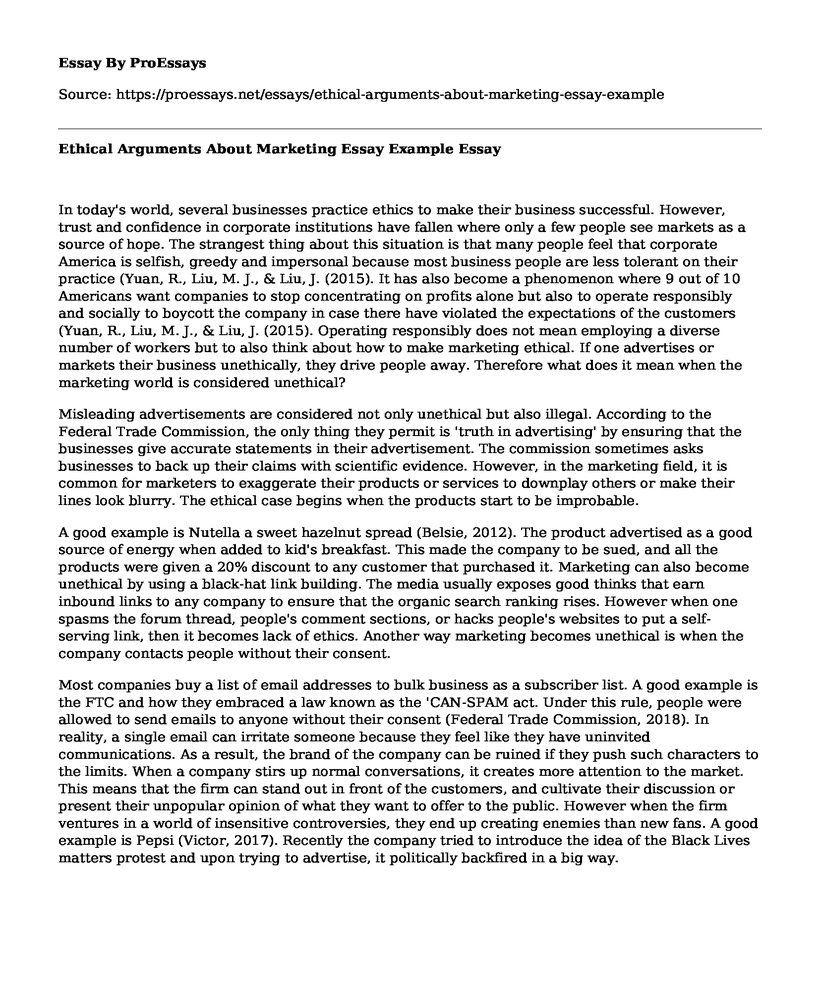In today's world, several businesses practice ethics to make their business successful. However, trust and confidence in corporate institutions have fallen where only a few people see markets as a source of hope. The strangest thing about this situation is that many people feel that corporate America is selfish, greedy and impersonal because most business people are less tolerant on their practice (Yuan, R., Liu, M. J., & Liu, J. (2015). It has also become a phenomenon where 9 out of 10 Americans want companies to stop concentrating on profits alone but also to operate responsibly and socially to boycott the company in case there have violated the expectations of the customers (Yuan, R., Liu, M. J., & Liu, J. (2015). Operating responsibly does not mean employing a diverse number of workers but to also think about how to make marketing ethical. If one advertises or markets their business unethically, they drive people away. Therefore what does it mean when the marketing world is considered unethical?
Misleading advertisements are considered not only unethical but also illegal. According to the Federal Trade Commission, the only thing they permit is 'truth in advertising' by ensuring that the businesses give accurate statements in their advertisement. The commission sometimes asks businesses to back up their claims with scientific evidence. However, in the marketing field, it is common for marketers to exaggerate their products or services to downplay others or make their lines look blurry. The ethical case begins when the products start to be improbable.
A good example is Nutella a sweet hazelnut spread (Belsie, 2012). The product advertised as a good source of energy when added to kid's breakfast. This made the company to be sued, and all the products were given a 20% discount to any customer that purchased it. Marketing can also become unethical by using a black-hat link building. The media usually exposes good thinks that earn inbound links to any company to ensure that the organic search ranking rises. However when one spasms the forum thread, people's comment sections, or hacks people's websites to put a self-serving link, then it becomes lack of ethics. Another way marketing becomes unethical is when the company contacts people without their consent.
Most companies buy a list of email addresses to bulk business as a subscriber list. A good example is the FTC and how they embraced a law known as the 'CAN-SPAM act. Under this rule, people were allowed to send emails to anyone without their consent (Federal Trade Commission, 2018). In reality, a single email can irritate someone because they feel like they have uninvited communications. As a result, the brand of the company can be ruined if they push such characters to the limits. When a company stirs up normal conversations, it creates more attention to the market. This means that the firm can stand out in front of the customers, and cultivate their discussion or present their unpopular opinion of what they want to offer to the public. However when the firm ventures in a world of insensitive controversies, they end up creating enemies than new fans. A good example is Pepsi (Victor, 2017). Recently the company tried to introduce the idea of the Black Lives matters protest and upon trying to advertise, it politically backfired in a big way.
Conclusion
Marketing is a world that requires truth and openness. Most companies as elaborated find themselves in unethical situations because they use ways that do not attract the public. It is therefore vital that each company comes up with advertisements that reveal the services or products they are offering to the public. A few examples given in the essay have shown that not only do such firms lose money but also lose their reputation.
References
Belsie, L. (2012, April 28). Nutella settles the lawsuit. You can get $20. Retrieved from https://www.csmonitor.com/Business/new-economy/2012/0427/Nutella-settles-lawsuit.-You-can-get-20
Federal Trade Commission. (2018, March 01). CAN-SPAM Act: A Compliance Guide for Business. Retrieved from https://www.ftc.gov/tips-advice/business-center/guidance/can-spam-act-compliance-guide-business
Victor, D. (2017, April 05). Pepsi Pulls Ad Accused of Trivializing Black Lives Matter. Retrieved from https://www.nytimes.com/2017/04/05/business/kendall-jenner-pepsi-ad.html?_r=0
Yuan, R., Liu, M. J., & Liu, J. (2015). Ethical marketing. Ethical and Social Marketing in Asia, 35-53. doi:10.1016/b978-0-08-100097-7.00002-7
Cite this page
Ethical Arguments About Marketing Essay Example. (2022, Dec 06). Retrieved from https://proessays.net/essays/ethical-arguments-about-marketing-essay-example
If you are the original author of this essay and no longer wish to have it published on the ProEssays website, please click below to request its removal:
- Strategic Public Relations
- Epistemology Essay
- Creating Native Habitats in Miami Essay Example
- Business Strategy: Achieving Competitive Advantage in Difficult Times
- Ethics in Qualitative Research: Challenges for Psychologists - Research Paper
- Essay Example on City Managers: Ensuring Economic Development Amidst Population Growth
- Irigaray's Ethics of Sex - Essay Example







